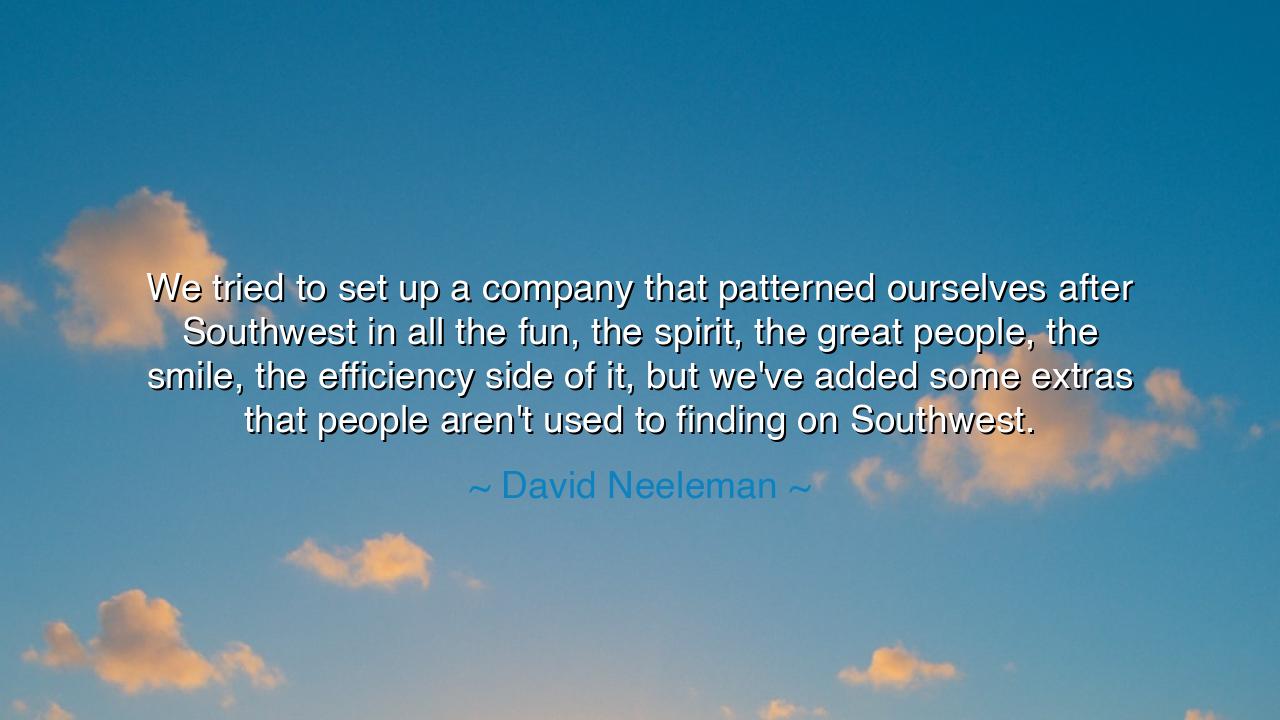
We tried to set up a company that patterned ourselves after
We tried to set up a company that patterned ourselves after Southwest in all the fun, the spirit, the great people, the smile, the efficiency side of it, but we've added some extras that people aren't used to finding on Southwest.






Hear the words of David Neeleman: “We tried to set up a company that patterned ourselves after Southwest in all the fun, the spirit, the great people, the smile, the efficiency side of it, but we’ve added some extras that people aren’t used to finding on Southwest.” These words are not merely about airlines, but about vision, inheritance, and transformation. In them we hear the echo of a truth that stretches back to the dawn of civilization: the wise builder studies the strong foundations of those before him, yet does not stop at imitation. He adds his own spirit, his own innovations, his own extras, and in doing so, he brings forth something new into the world.
The ancients themselves lived by this principle. Rome, in its rise, patterned itself upon Greece. It took Greek gods, Greek art, Greek philosophy, and reshaped them, adding Roman discipline, governance, and engineering genius. The result was not a copy, but a new empire—one that surpassed its inspiration in endurance and reach. Neeleman, in seeking to mirror the fun, the spirit, the smile, and the efficiency of Southwest Airlines, followed the same ancient wisdom: honor what works, preserve its essence, and then add what only you can give.
Consider the story of Alexander the Great. He inherited from his father Philip the tools of conquest: a disciplined army, new weapons, and a vision of uniting Greece. But Alexander did not stop there. He patterned himself after his father’s achievements, yet added his own extras—his audacity, his dream of spreading Greek culture, his passion for founding cities that would outlast his campaigns. Like Neeleman, he saw the power in following a proven path, but also in surpassing it with innovations of his own.
What Neeleman honors most in Southwest is not just its low fares or quick turns, but the intangible—the smile, the spirit, the warmth of great people who turn flying into more than transport. This is wisdom: to know that efficiency alone cannot sustain the soul of an enterprise. People yearn not only for speed and cost, but for kindness, connection, and delight. By adding his own innovations—luxuries, comforts, or attentions to detail not found elsewhere—Neeleman demonstrated that greatness is not in discarding what works, but in enriching it.
Yet we must also see the humility in his words. To pattern oneself after another is not weakness, but strength. The arrogant founder seeks to reinvent from nothing, scorning the lessons of those before. The wise founder studies, learns, and adapts. Even the greatest thinkers—Aristotle, Aquinas, Newton—stood upon the shoulders of their predecessors. Neeleman’s acknowledgment of Southwest reveals the humility of the true innovator: to honor one’s teachers while striving to transcend them.
The lesson for us is profound: in whatever work we do, let us not shun imitation, nor rest in it. First, study the models of greatness. Learn the habits of those who came before you—their efficiency, their spirit, their smiles, their practices of discipline. Then, add your own voice, your own extras, the gifts that no one else can bring. This is how families grow, how businesses thrive, how nations endure: by building upon what is good, and daring to make it better.
So let this wisdom endure: greatness is not born from nothing, but from transformation. Like Neeleman, find the models worth following, the examples worth honoring. Then add your own touch—your joy, your vision, your courage—and in this way, you will create something both familiar and new, something that honors the past while shaping the future. For it is in the smile, the spirit, and the boldness to add the extras that true innovation is born.






AAdministratorAdministrator
Welcome, honored guests. Please leave a comment, we will respond soon